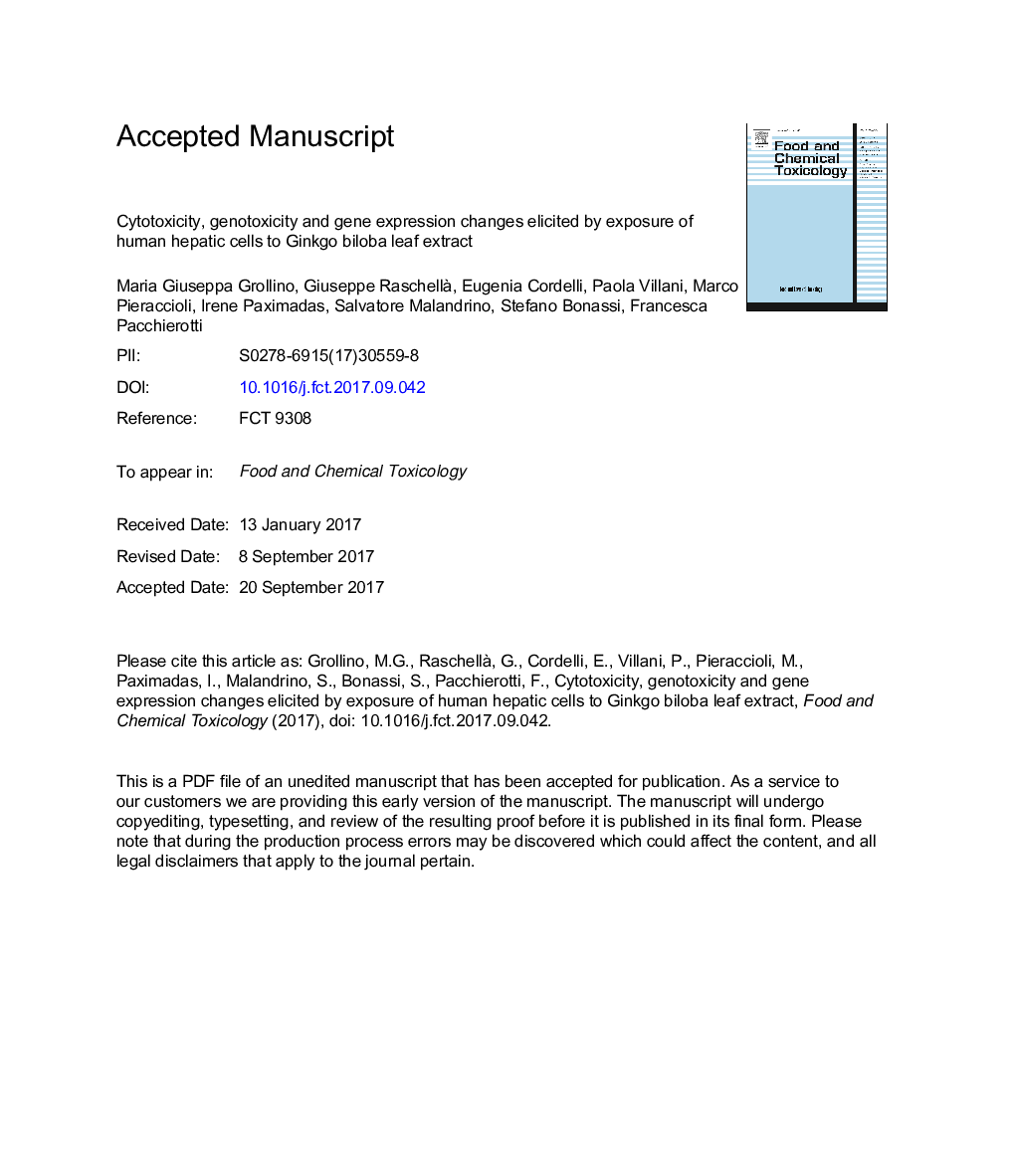| کد مقاله | کد نشریه | سال انتشار | مقاله انگلیسی | نسخه تمام متن |
|---|---|---|---|---|
| 5559991 | 1403305 | 2017 | 40 صفحه PDF | دانلود رایگان |
عنوان انگلیسی مقاله ISI
Cytotoxicity, genotoxicity and gene expression changes elicited by exposure of human hepatic cells to Ginkgo biloba leaf extract
ترجمه فارسی عنوان
سمیت سلولی، سمیت ژنوتوکسی و تغییرات ژنی بیان شده توسط قرار گرفتن در معرض سلول های کبدی انسان به عصاره برگ گینکگو بیولوک
دانلود مقاله + سفارش ترجمه
دانلود مقاله ISI انگلیسی
رایگان برای ایرانیان
کلمات کلیدی
JaCVAMEuropean Collection of Cell CulturesPBSECACCOECDHepG2NTPEMAAFB1 - AFB 1DMSO - DMSOROS - ROSAflatoxin B1 - آفلاتوکسین B1International Agency for Research on Cancer - آژانس بین المللی تحقیقات سرطانIARC یا International Agency for Research on Cancer - آژانس بین المللی تحقیقات سرطانISO - ایزوNational Toxicology Program - برنامه سم شناسی ملیMolecular analysis - تجزیه و تحلیل مولکولیDimethyl sulfoxide - دیمتیل سولفواکسیدInternational Organization for Standardization - سازمان بین المللی استاندارد سازیCytotoxicity - سمیت سلولیGenotoxicity - سمیت ژنتیکیPhosphate buffered saline - فسفات بافر شورCAR - ماشینGinkgo biloba - کهن دار، جینکو، ژینکو بیلوباReactive oxygen species - گونههای فعال اکسیژن
موضوعات مرتبط
علوم زیستی و بیوفناوری
علوم کشاورزی و بیولوژیک
دانش تغذیه
چکیده انگلیسی
The use of Ginkgo biloba leaf extract as nutraceutical is becoming increasingly common. As a consequence, the definition of a reliable toxicological profile is a priority for its safe utilization. Recently, contrasting data have been reported on the carcinogenic potential of Ginkgo biloba extract in rodent liver. We measured viability, Reactive Oxygen Species (ROS), apoptosis, colony-forming efficiency, genotoxicity by comet assay, and gene expression changes associated with hepato-carcinogenicity in human cells of hepatic origin (HepG2 and THLE-2) treated with different concentrations (0.0005-1.2Â mg/mL) of Ginkgoselect®Plus. Our analyses highlighted a decrease of cell viability, not due to apoptosis, after treatment with high doses of the extract, which was likely due to ROS generation by a chemical reaction between extract polyphenols and some components of the culture medium. Comet assay did not detect genotoxic effect at any extract concentration. Finally, the array analysis detected a slight decrease in the expression of only one gene (IGFBP3) in Ginkgo-treated THLE-2Â cells as opposed to changes in 28 genes in Aflatoxin B1 treated-cells. In conclusion, our results did not detect any significant genotoxic or biologically relevant cytotoxic effects and gross changes in gene expression using the Ginkgo extract in the hepatic cells tested.
ناشر
Database: Elsevier - ScienceDirect (ساینس دایرکت)
Journal: Food and Chemical Toxicology - Volume 109, Part 1, November 2017, Pages 486-496
Journal: Food and Chemical Toxicology - Volume 109, Part 1, November 2017, Pages 486-496
نویسندگان
Maria Giuseppa Grollino, Giuseppe Raschellà , Eugenia Cordelli, Paola Villani, Marco Pieraccioli, Irene Paximadas, Salvatore Malandrino, Stefano Bonassi, Francesca Pacchierotti,
